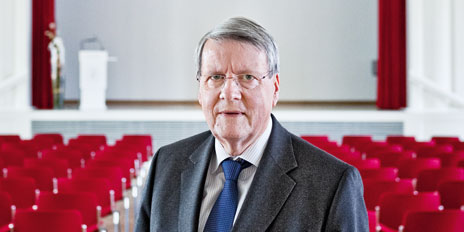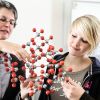“Science plays a central role”
Global health can only be maintained with the aid of research, says Jörg Hacker, President of the German National Academy of Sciences Leopoldina. Under its leadership, the national science academies of the G20 states have developed scientific recommendations.


Professor Hacker, the German G20 Presidency is making health policy an important focus. In concrete terms, which global challenges need to be overcome?
Infectious diseases and increasingly also non-communicable diseases do not only threaten the health of individuals, but are also an immense burden on public healthcare systems. They compromise the growth and development opportunities of individual countries. They reduce productivity worldwide and thus have considerable negative effects on global economic output. They can represent a threat to the social and political stability of entire regions. The Ebola and Zika outbreaks have demonstrated how dangerous infectious diseases can grow from local events to global crises within a short space of time. However, diseases like cancer, diabetes and cardiovascular disorders also confront all countries with immense challenges. In short, the development of effective healthcare systems and the provision of universal healthcare are among the most urgent tasks of the 21st century.
What can the Science20 dialogue forum accomplish here?
We would like to draw attention to these challenges with the Science20 dialogue forum, which is being held for the first time. The event is the culmination of the new Science20 dialogue process within the framework of the German G20 Presidency, with whose coordination the Leopoldina was commissioned by Federal Chancellor Angela Merkel. Together with the national science academies of the G20 states we have developed recommendations for improving global health that Federal Chancellor Angela Merkel will accept in person during the Science20 dialogue forum.
What are the three most important recommendations?
With the focus on communicable and non-communicable diseases, we have defined a key thematic area that makes it possible to bring together the diverse range of expertise of the G20 academies and illustrate the common challenges. As national science academies we call upon the heads of state and government of the G20 countries to strengthen public healthcare and take into account the influence on health of social, ecological and economic factors. From our perspective, the scientifically proven link between communicable and non-communicable diseases deserves special attention.
First of all, the most important recommendation of the G20 science academies is the worldwide development of reliable and resilient healthcare systems. These must record and evaluate diseases and provide effective measures of treatment and prevention. Furthermore, they should guarantee unrestricted access to comprehensive primary care. This also includes the performance of vaccinations with high-quality vaccines.
Second, policy must address the social, ecological and economic determinants of health worldwide. Reducing poverty, hunger and environmental pollution, securing standards of hygiene, as well as access to clean drinking water and sanitation are essential preconditions for health. The latter also include early and continuous public education about risk factors, such as unhealthy nutrition, lack of exercise or the consumption of cigarettes, drugs or alcohol and their health impacts.
Third, in our report as G20 science academies we name strategic health policy instruments, such as securing worldwide access to diagnostics, medical technology and therapeutic medicines, as well as to high-quality vaccines. It is important here to promote trust in the safety of vaccinations because of the proven advantages. We must also continue to rigorously counter the development of antibiotic resistance. Health reporting and the international exchange of data must be expanded and laboratory capacities increased in order to improve the global monitoring of communicable and non-communicable diseases. Intervention mechanisms are especially effective if they are based on a holistic One Health approach that recognises the systemic relationships between humans, animals, the environment and health.
Which German research institutions are doing exemplary work in the field of global health?
In Germany we can draw on a wide range of scientific expertise in this field. In the first instance, reference should certainly be made to the Robert Koch Institute as the central monitoring and research institution in the Federal Republic. When it comes to the global dimension of infectious diseases, for example, it plays an important role in strengthening capacities in different partner countries during outbreak and crisis situations. However, the Paul-Ehrlich-Institut in Langen and the Bernhard Nocht Institute in Hamburg also play important roles in this context. Furthermore, many research institutions and also German non-governmental organisations are engaged in work on global health issues.
However, medicine and health have long also been core topics of the Leopoldina. In its scientific consulting for politics and society, the academy examines new developments in medical research and throws light on the political and social impacts of issues such as genetic diagnosis, personalised medicine and public healthcare from a scientific perspective.
In the Science20 report, the G20 academies emphasise the central role of science in improving global health. Science will continue to research the causes and interdependencies of communicable and non-communicable diseases. Scientific research and its findings enable more effective measures to prevent and combat disease, as well as more effective medical interventions. The funding of basic research and applied science remains essential here.
Interview: Clara Krug
Science20 dialogue forum
The annual summit of G20 heads of state and government will meet in the northern German city of Hamburg on 7 and 8 July 2017. Great importance is attached to dialogue with different civil society groups. For the first time, the research community is participating in the G20 process as Science20. Under the leadership of the German National Academy of Sciences Leopoldina, the science academies of the G20 countries have developed scientific recommendations for improving global health. At the Science20 dialogue forum on 22 March 2017 in Halle (Saale), national and international experts delivered their findings and the presidents of the national science academies officially presented the recommendations to Federal Chancellor Angela Merkel.

